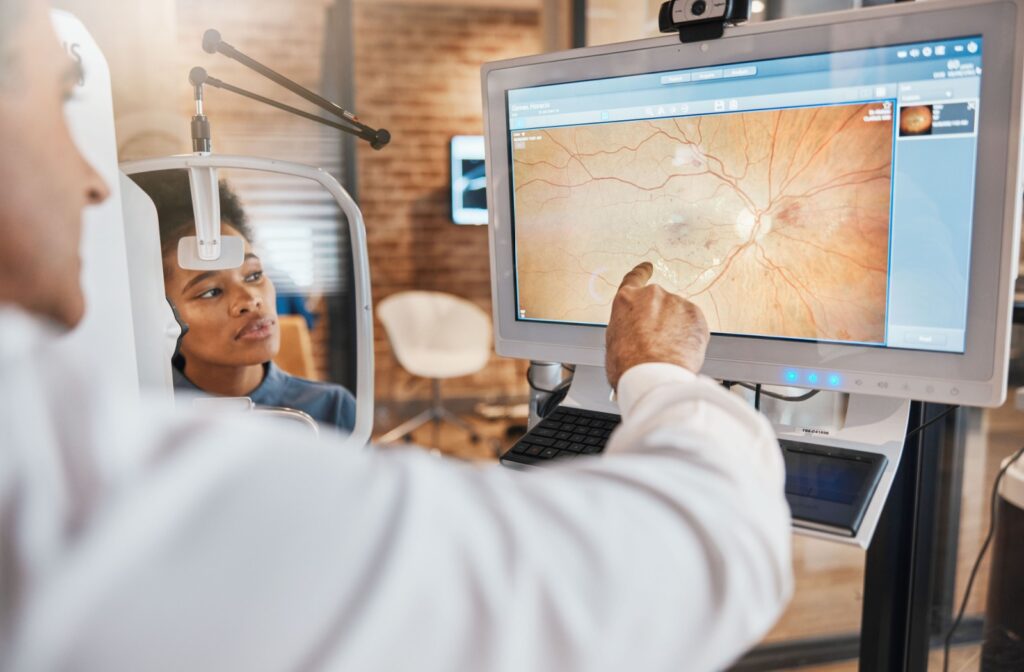It’s normal to experience subtle changes in your vision, especially as you grow older.
While a pair of reading glasses is generally nothing to worry about (thank you, presbyopia), certain symptoms, such as difficulty reading or seeing fine details, could be more than a natural part of aging.
Macular degeneration is a progressive eye condition that affects the macula, a structure in the retina responsible for sharp, central vision. The first signs of this condition include:
- Blurry central vision
- Difficulty recognizing faces
- Distorted or wavy vision
- Reduced ability to see in low-light
- Blind spots in central vision
If you experience any of these symptoms, it’s time to take action.
What is Macular Degeneration?
Age-related macular degeneration is an eye condition that primarily affects the macula, the central part of the retina, the light-sensitive tissue at the back of your eye.
The macula is responsible for sharp, central vision, which we rely on daily when reading, driving, or recognizing faces. When the macula deteriorates, this affects the quality of central vision, leading to blurry or distorted vision. In severe cases, a person might lose their central vision entirely.
There are two main types of age-related macular degeneration:
- Dry Macular Degeneration: The most common form, accounting for about 80–90% of cases. It occurs when the macula gradually thins and small yellow deposits (drusen) start to appear.
- Wet Macular Degeneration: Less common but more severe, this occurs when abnormal blood vessels grow under the retina and leak fluid or blood, causing rapid vision loss.
Although there is a distinction between these two forms of the condition, they can have overlapping symptoms in their early stages. While we have yet to find a cure for macular degeneration, there are measures we can take to slow its progression.
The First Signs of Macular Degeneration
Macular degeneration develops gradually, making early signs easy to miss. Staying on top of your routine eye exams is the most proactive defensive measure.
Through regular monitoring, your optometrist can evaluate your vision (including visual sharpness and central vision) and assess the health of your retina, making it easier to detect and manage any concerns before they progress.
In the meantime, familiarizing yourself with these symptoms can make a substantial difference in managing macular degeneration. Here are the first signs to watch for:
Blurriness in Central Vision
Since macular degeneration affects the macula, one of its earliest signs is blurry central vision.
Your central vision is what you see right in front of you, whereas peripheral vision (which glaucoma affects) is your “side vision”. A quick comparison shows that your central vision is much sharper and sees finer detail.
As macular damage continues, you might notice changes in central vision, affecting your ability to read, view digital screens, or look at objects right in front of you. Your peripheral vision often remains unaffected, which can make these changes feel less alarming.

Difficulty Recognising Faces
Since macular degeneration affects your ability to see fine details, recognizing faces can become more challenging.
You might find yourself relying on peripheral cues, like someone’s posture or a hand wave, instead of their facial features.
Distorted or Wavy Vision (Metamorphopsia)
If straight lines, such as grid patterns or the edges of doorways, appear bent or wavy, this could indicate macular degeneration.
This phenomenon, known as metamorphopsia, is a key symptom of the condition, particularly in its early stages.
Reduced Ability to See in Low Light
You might find it harder to adjust your eyes when moving from a bright environment to a dimly lit one.
This reduced capability to see in low-light conditions, known as dark adaptation issues, can make evening activities like driving difficult.
Blind Spots in Central Vision
Small blind spots, known as scotomas, might appear in your central vision.
Although they may start small and barely noticeable, they can grow larger over time if the condition progresses untreated.
Why You Should See an Optometrist Immediately
Experiencing these symptoms doesn’t necessarily mean that macular degeneration is the driving force behind them, but an accurate diagnosis and thorough evaluation are absolutely vital for preserving your sight.
Here’s why early intervention matters so much:
- Slows Disease Progression: We can manage the progression of macular degeneration. The sooner we begin treatment, the better. Dry macular degeneration can benefit from lifestyle changes and dietary supplements, while wet macular degeneration may require anti-VEGF injections to reduce abnormal blood vessel growth.
- Prevents Further Vision Loss: The earlier the condition is diagnosed, the better your odds of preserving your current level of vision.
- Custom Treatment Plans: Your optometrist can design a treatment and monitoring plan tailored for you, so you receive the care you deserve.
Macular degeneration manifests slowly, often before you experience noticeable symptoms.
Advanced imaging tools, such as Optical Coherence Tomography (OCT) and Fundus Photography, allow our team to detect macular degeneration at its earliest stage. Staying on top of your vision and overall eye health has never been easier.
Protect Your Vision with Healthy Habits
Macular degeneration is not always preventable, but there are measures you can take to reduce your risk and protect your vision:
- Quit smoking: Smoking significantly increases your risk of developing macular degeneration.
- Maintain a healthy diet: Include leafy greens, fruits, and omega-3 fatty acids. Foods rich in antioxidants like lutein and zeaxanthin are particularly beneficial for eye health.
- Manage chronic health conditions: Conditions like high blood pressure and diabetes can exacerbate macular degeneration without proper management.
- Wear UV protection: Use sunglasses that block 100% of UVA and UVB rays to protect your eyes from harmful exposure.
- Regular eye exams: Routine visits with your optometrist can catch early signs of the disease and help monitor your overall eye health.
Stay Proactive About Your Eye Health
Recognizing the first signs of macular degeneration and seeking timely intervention can make a considerable difference in your vision and overall quality of life.
If you’re experiencing any of these symptoms, or perhaps it’s been a while since your last eye exam, connect with Trinity Hills Eyecare and book an appointment today.




